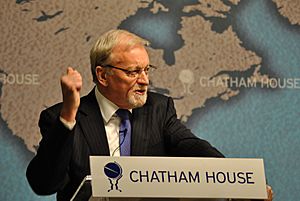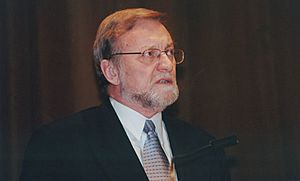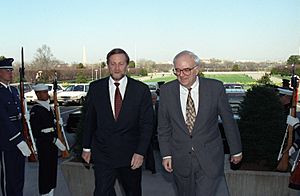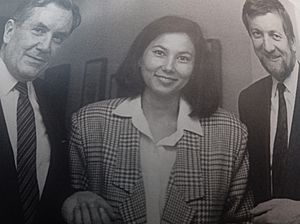Gareth Evans (politician) facts for kids
Quick facts for kids
Gareth Evans
|
|
|---|---|

Evans at Chatham House in 2011
|
|
| Chancellor of Australian National University | |
| In office 1 January 2010 – 1 January 2020 |
|
| Preceded by | Kim Beazley |
| Succeeded by | Julie Bishop |
| Deputy Leader of the Opposition | |
| In office 19 March 1996 – 19 October 1998 |
|
| Leader | Kim Beazley |
| Preceded by | Peter Costello |
| Succeeded by | Simon Crean |
| Deputy Leader of the Labor Party | |
| In office 19 March 1996 – 19 October 1998 |
|
| Leader | Kim Beazley |
| Preceded by | Kim Beazley |
| Succeeded by | Simon Crean |
| Leader of the Government in the Senate | |
| In office 24 March 1993 – 11 March 1996 |
|
| Prime Minister | Paul Keating |
| Deputy | Robert Ray |
| Preceded by | John Button |
| Succeeded by | Robert Hill |
| Minister for Foreign Affairs | |
| In office 2 September 1988 – 11 March 1996 |
|
| Prime Minister | Bob Hawke Paul Keating |
| Preceded by | Bill Hayden |
| Succeeded by | Alexander Downer |
| Minister for Transport and Communications | |
| In office 24 July 1987 – 2 September 1988 |
|
| Prime Minister | Bob Hawke |
| Preceded by | Peter Morris |
| Succeeded by | Ralph Willis |
| Minister for Resources and Energy | |
| In office 13 December 1984 – 24 July 1987 |
|
| Prime Minister | Bob Hawke |
| Preceded by | Peter Walsh |
| Succeeded by | John Kerin |
| Attorney-General of Australia | |
| In office 11 March 1983 – 13 December 1984 |
|
| Prime Minister | Bob Hawke |
| Preceded by | Peter Durack |
| Succeeded by | Lionel Bowen |
| Member of the Australian Parliament for Holt |
|
| In office 2 March 1996 – 30 September 1999 |
|
| Preceded by | Michael Duffy |
| Succeeded by | Anthony Byrne |
| Senator for Victoria | |
| In office 1 July 1978 – 2 March 1996 |
|
| Succeeded by | Stephen Conroy |
| Personal details | |
| Born |
Gareth John Evans
5 September 1944 Melbourne, Victoria, Australia |
| Political party | Labor |
| Spouse | Merran Evans |
| Children | Caitlin Evans Eamon Evans |
| Alma mater | University of Melbourne Magdalen College, Oxford |
| Profession | Academic, barrister |
Gareth John Evans (born 5 September 1944) is an Australian politician, international expert, and lawyer. He was a member of the Labor Party in the Australian Parliament from 1978 to 1999. During this time, he served as a government minister under Prime Ministers Bob Hawke and Paul Keating from 1983 to 1996.
His important roles included being the Attorney-General, Minister for Resources and Energy, Minister for Transport and Communications, and most notably, the Minister for Foreign Affairs from 1988 to 1996. He was also a leader in the Senate and Deputy Leader of the Opposition. He is one of the longest-serving federal ministers in Labor Party history.
After leaving politics, he led the International Crisis Group, an organization that works to prevent conflicts around the world, from 2000 to 2009. He has also been involved in many international groups focused on preventing major crimes and controlling weapons. From 2010 to 2020, he was the Chancellor of the Australian National University (ANU).
Contents
Early Life and Education
Gareth Evans was born in Melbourne, Victoria. His father was a tram driver, and his mother ran a small business from home.
He went to Melbourne High School and then the University of Melbourne. There, he studied arts and law, graduating with high honors. He was also the president of the Students Representative Council. Later, he studied at Magdalen College, Oxford in England on a special scholarship, earning a Master of Arts degree.
Career Highlights
From 1971 to 1976, Evans taught law at the University of Melbourne. He became well-known for discussing legal issues, especially during the time of the Whitlam Government in 1975. He also worked as a lawyer, focusing on industrial law.
Evans was always interested in protecting civil liberties. He campaigned on issues like censorship and worked with groups like the Victorian Aboriginal Legal Service. He helped draft important laws like the Racial Discrimination Act 1975. He joined the Australian Labor Party while at university and was elected to the Senate in 1977.
Parliamentary and Ministerial Roles
Early Years in Opposition (1978–1983)
As a new member of Parliament, Evans helped choose the design for the new Australian Parliament House. He focused on legal and constitutional reforms. In 1980, he became the Shadow Attorney-General, which meant he was the main spokesperson for the Labor Party on legal matters while they were not in power.
He helped modernize the Labor Party's goals and supported Bob Hawke in becoming the party leader. This led to Labor winning the 1983 election.
Attorney-General (1983–1984)
As Attorney-General, Evans worked on many law reforms. One early event that caused discussion was when he arranged for the Royal Australian Air Force to take photos of the Franklin Dam project in Tasmania. The government wanted to stop the project because it was in a World Heritage area. This led to him being nicknamed "Biggles."
He helped create important bodies like the Commonwealth Director of Public Prosecutions and the National Crime Authority. He also strengthened laws about family matters and freedom of information. After the 1984 election, he moved to the role of Minister for Resources and Energy.
Resources, Energy, Transport, and Communications (1984–1988)
In these roles, Evans helped manage big projects like the North West Shelf gas project. He also dealt with the effects of falling world oil prices.
Later, as Minister for Transport and Communications, he worked on making major airlines more competitive and reforming government-owned businesses in areas like telecommunications. These changes aimed to make these businesses run more like private companies.
Minister for Foreign Affairs (1988–1996)
Evans became Foreign Minister in September 1988 and held the position for over seven years, making him one of Labor's longest-serving foreign ministers. He was highly respected internationally. The Australian government at this time wanted to build stronger relationships with Asian countries like Indonesia and China.
Evans developed new ideas for foreign policy, such as "middle power" diplomacy and "good international citizenship." His major achievements included:
- Starting the UN peace plan for Cambodia.
- Helping to create the International Chemical Weapons Convention.
- Establishing the Asia Pacific Economic Cooperation (APEC) forum.
- Setting up the ASEAN Regional Forum (ARF).
He faced some challenges, particularly regarding relations with Indonesia over East Timor. Australia recognized Indonesia's control over East Timor after its invasion in 1975. Evans worked to achieve more self-rule for East Timor, and later, after East Timor's independence, the benefits of the Timor Gap Treaty were inherited by the new nation.
Leader of the Government in the Senate (1993–1996)
In 1993, Evans became the Leader of the Government in the Senate. In this role, he guided the government's laws through the upper house of Parliament, where the government did not have a majority. This meant he had to negotiate with other parties to get laws passed.
He played a key role in passing the government's Native Title Act 1993, which was a very important law for Indigenous Australians.
Return to Opposition (1996–1999)
Evans moved from the Senate to the House of Representatives in 1996. He became the Deputy Leader of the Labor Party and Shadow Treasurer. He led a major review of the party's policies.
After Labor lost the 1998 election, Evans resigned from his leadership role. He left Parliament in September 1999.
International Work After Politics
International Crisis Group Leadership
From 2000 to 2009, Evans was the president and CEO of the International Crisis Group (ICG). This organization, based in Brussels, works to prevent and resolve conflicts around the world. During his time, the ICG grew significantly, working in over 60 countries and publishing many reports.

The ICG helped by giving early warnings about conflicts, supporting peace talks, and providing detailed analysis to leaders on conflict issues. It became a leading international non-governmental organization (NGO) focused on preventing deadly conflicts.
The Responsibility to Protect (R2P)
From 2000 to 2001, Evans co-chaired a commission that created the idea of "The Responsibility to Protect" (R2P). This idea was later supported by the United Nations General Assembly in 2005.
The main idea of R2P is that:
- Every country has a responsibility to protect its own people from serious crimes like genocide.
- The international community should help countries that cannot protect their people on their own.
- If a country fails to protect its citizens and peaceful solutions don't work, the international community has a responsibility to intervene, with military action as a last resort, approved by the UN Security Council.
Evans is widely recognized for his important role in developing and promoting this concept around the world.
Other International Roles
Evans has served on many other international groups and commissions. These include:
- The UN Secretary General's High Level Panel on Threats, Challenges and Change, which looked at global threats and UN reforms.
- The Carnegie Commission on Preventing Deadly Conflict.
- The Weapons of Mass Destruction Commission, which focused on nuclear issues.
- The International Commission on Nuclear Non-proliferation and Disarmament, which he co-chaired.
He is also involved with several other international organizations that work on global issues like nuclear non-proliferation and peace.
Academic Career and Books
Before entering politics, Evans was a law lecturer at the University of Melbourne. After his political career and leading the International Crisis Group, he returned to academic life.
He was the Chancellor of the Australian National University (ANU) from 2010 to 2020. He has also lectured at many universities worldwide, including Oxford, Cambridge, Princeton, and Yale.
Evans has written or edited 14 books. Some of his major works include:
- Good International Citizenship: The Case for Decency (2022)
- Incorrigible Optimist: A Political Memoir (2017)
- Inside the Hawke-Keating Government: A Cabinet Diary (2014)
- The Responsibility to Protect: Ending Mass Atrocity Crimes Once and for All (2008)
- Australia's Foreign Relations (with Bruce Grant)
- Cooperating for Peace: The Global Agenda for the 1990s
He has also published many articles in journals and newspapers on topics like foreign relations, politics, human rights, and legal reform.
Ideas on International Relations
Good International Citizenship
Evans introduced the idea of "good international citizenship." This means that being a good global citizen is important for a country's national interest, not just for being nice. It's about helping other countries with their problems, which can lead to them helping you in return. It also builds a good reputation for the country.
Niche Diplomacy
"Niche diplomacy" is a method used by "middle powers" (countries that are not superpowers but still have influence). Evans described it as focusing a country's efforts and resources on specific areas where they can make the most impact, rather than trying to do everything. This allows them to be persuasive and work with other like-minded countries.
Cooperative Security
Evans won an award for his ideas on "cooperative security." He explained it as a way of thinking about international safety that focuses on working together. It means:
- Talking things through instead of fighting.
- Reassuring each other instead of threatening.
- Being open and transparent instead of secretive.
- Preventing problems instead of just fixing them.
- Understanding that countries depend on each other.
Awards and Recognition
Gareth Evans has received many honors and awards for his work:
- In 2012, he was named a Companion of the Order of Australia (AC), one of Australia's highest honors, for his service to international relations, conflict prevention, and arms control.
- He was previously made an Officer of the Order of Australia (AO) in 2001.
- He has received honorary doctorates from several universities.
- In 2005, he and the International Crisis Group were named "Heroes of 2005" by Time magazine.
- In 2010, he received the Roosevelt Institute Four Freedoms Award for Freedom from Fear, recognizing his work on the Responsibility to Protect.
- In 2011, he received the Amartya Sen Award for his leadership in working towards a world free of nuclear weapons.
- Foreign Policy magazine named him one of the Top 100 Global Thinkers in 2011.
- He received the Sir Edward 'Weary' Dunlop Asialink Medal in 2016 for improving Australia-Asia relations.
- In 2023, he was given the ROK Jeju 4.3 Peace Award for his contributions to peace, reconciliation, and human rights.
- Earlier in his career, he won the ANZAC Peace Prize in 1994 for his role in the Cambodian Peace Process and the University of Louisville Grawemeyer Prize for Ideas Improving World Order in 1995.
Personal Life
Gareth Evans has been married to Professor Merran Evans since 1969. They have two adult children and four grandchildren.
He is a lifelong supporter of the Hawthorn Football Club. His hobbies include reading, writing, traveling, architecture, opera, and golf.
Books by Gareth Evans
- Good International Citizenship: The Case for Decency (2022)
- Incorrigible Optimist: A Political Memoir (2017)
- Nuclear Weapons: The State of Play 2015 (with Ramesh Thakur and Tanya Ogilvie-White) (2015)
- Inside the Hawke-Keating Government: A Cabinet Diary (2014)
- Nuclear Weapons: The State of Play (with Ramesh Thakur) (2013)
- The Responsibility to Protect: Ending Mass Atrocity Crimes Once and for All (2008)
- Australia's Foreign Relations (with Bruce Grant) (1995)
- Cooperating for Peace: The Global Agenda for the 1990s and Beyond (1993)
- Australia's Constitution (with John McMillan and Haddon Storey) (1983)
- Labor Essays 1982: Socialist Principles and Parliamentary Government (with John Reeves) (1982)
- Labor Essays 1981 (with John Reeves and Justin Malbon) (1981)
- Labor Essays 1980 (with John Reeves) (1980)
- Law, Politics and the Labor Movement (editor) (1980)
- Labor and the Constitution, 1972–1975 (editor) (1977)
 | Frances Mary Albrier |
 | Whitney Young |
 | Muhammad Ali |



